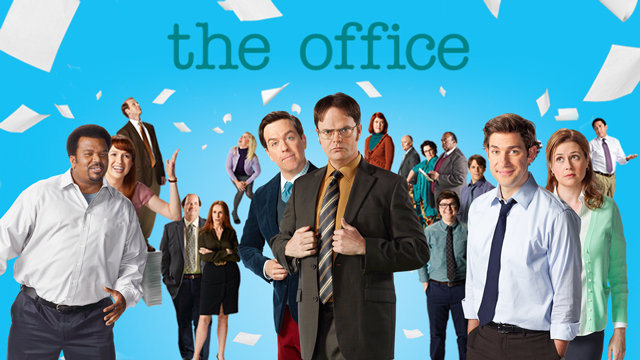The Office, a mockumentary sitcom airing on NBC from 2005 to 2013, showcases and parodies the lives of normal white-collar workers in a midsize paper company. The show garnered critical praise and numerous awards, including an Emmy for best comedy series (NBC). Nearly everyone agrees that The Office is funny, but why? Why are we laughing at a show whose premise initially appears so mundane? What’s so funny?

To answer this question, let’s first consider the ideas of critical theorists—thinkers who reflect on society and culture—concerning laughter and comedy in general, and see if we can apply those theories to the show. In his essay “The Culture Industry,” Theodor Adorno, a prominent critical theorist, argues that the laughter that comes from consuming pop culture is devoid of happiness. In the context of the culture industry, he contends, we are laughing where there exists nothing to laugh about; the culture industry merely demonstrates to us how terrible our lives really are, and we laugh at our own misery. Thus, culture industry-fueled laughter for Adorno is inherently bad; it is a way of “cop[ing] with fear” by refusing to engage productively with the suffering that encompasses most of our lives and instead parodying it (Adorno, 112). According to other critical theorists and Adorno himself, however, not all laughter is “wrong;” the good laughter comes from reconciliation, from actually acknowledging our suffering and fighting it (Rada, 152). Adorno writes that this “reconciled laughter resounds with the echo of escape from power” (Adorno, 112). Laughter can actually help us escape our suffering rather than contribute to it.
Thus we have arrived at two different overarching types of laughter: the good and the bad, the wrong and the right. Where, then, does The Office fit into this spectrum? Are we laughing because The Office demonstrates to us how bad our lives really are? Or are we laughing because it helps us reconcile with and escape this suffering? Thus the question is not only why we are laughing, but also what the laughter accomplishes for us. Does it bring us more suffering or turn our suffering into happiness?
Because The Office was such a successful show, a few observers have tried to uncover where that success came from—meaning they explored the question we are now exploring. These observers mostly converged on the same one theory, though they expressed it differently. This is the theory that people like the show and find it funny because it makes them glad their lives are better than those of the characters in the show. By displaying a terrible work environment, this theory argues, the show brightened the lives of the viewers who realized their lives in comparison really weren’t that bad after all (Craft). Another phrasing of this theory is that the show is “cringe-worthy comedy,” which boils down to the same thing; people are laughing at how bad the character’s lives are because it makes them feel better about their own—they are laughing at other people’s misery (Carter). In Adornian terms, this theory exists somewhere in the middle of the spectrum of laughter; we are not laughing at our own suffering, but we are also not confronting and overcoming our own suffering. In any case, the theory, though popular, remains utterly unconvincing, given that we relate to some of the characters on the screen, which any Office fan will confirm. We cannot laugh at the relative misery of people while also relating to them, or at least not while still thinking ourselves better off than them.
So if the pervading theory explaining the humor of The Office fails to truly explain why so many people find it funny, then what is the right answer? To explore this, we must first determine which character or characters on the show viewers relate to the most. Because viewers are not laughing at the characters as in the pervading theory, they must be laughing with some of them. After all, the premise of this comedy—the modern American workspace—is far from foreign to most viewers. The most likely candidates that we as viewers would relate to are Jim and Pam, the two most normal and initially likeable of the major characters. Jim, the bored, sarcastic salesman, functions as the closest thing we have to a protagonist, with Pam, the likeable receptionist, a close second. As co-protagonists, Pam and Jim function as our stand-ins in the show as viewers. If we are laughing at how terrible their lives are, then we are just laughing about our own lives as well. So what are Jim and Pam’s lives like? Are they really terrible?
The most prominent of the other office employees—Dwight and Michael—both initially appear to be terrible coworkers, yet, despite their shortcomings, we end up becoming sympathetic to them. Dwight, Jim’s eccentric fellow salesman, bullies and belittles his fellow coworkers; at many points, he actively tries to sabotage Jim’s life by getting him in trouble or fired. Though less bluntly mean-spirited, Michael is a terrible boss, endlessly annoying his workers and making everyone thoroughly uncomfortable. To the viewers seeing through the eyes of Jim and Pam, Dwight and Michael represent their own evil coworkers and their own dumb bosses. The fact that these viewers are laughing, then, would seem to suggest—at first glance—that they are laughing at how depressing their own lives are. In this view, if we find Dwight and Michael funny—and we most certainly do—then our laughter truly is “wrong”—there is nothing to laugh about. However, there is another, more convincing view to be taken in light of more evidence. As the series progresses even just beyond the first few episodes and we as viewers—alongside Jim and Pam—learn more about Dwight and Michael, they become increasingly sympathetic characters. We do not hate them, but instead learn to love them despite their shortcomings. Yes, we laugh at those shortcomings, but only because they have become endearing, not because we are laughing at our own suffering, for we have begun to realize we aren’t only suffering. Hold on to you reservations, as I will explain this more later.

The second aspect in which this show seemingly parodies our lives—the tedious office work—also turns a negative into a positive. Jim especially struggles with the mundaneness of the work he has to do and the pointlessness of it all. When we laugh at Jim’s struggle with his dull work, in the “wrong” laughter viewpoint we are parodying ourselves by laughing at our own suffering, but in reality that’s not what we are laughing at. His need to play pranks on Dwight and his other coworkers can be taken as a depressing take on the banality of office life—that it is so boring that you must find absurd ways to amuse yourself to receive any enjoyment—and that is partially true. Yes, parts of work are terrible, but that does not mean it’s terrible in its entirety. Jim has found a way to amuse himself even in this supposedly mundane environment. By laughing along with—not at—him in his attempts to have fun, we are reminded of the things in our lives that give us pleasure, reminded of our versions of his silly pranks. Adorno in “The Culture Industry” argues that laughter is the enemy of happiness because we are laughing at our own suffering, but by laughing at The Office, we are helping to alleviate that suffering—and not by the plain act of laughing itself. By reminding ourselves that our lives are not all bad, by urging ourselves to think about the good aspects of our lives rather than dwell on the bad, we reconcile with and confront the suffering in our lives.
To further elucidate this idea, I want to examine it in the context of a classic Office scene: identity theft, one of Jim’s pranks on Dwight. Jim comes in for the workday dressed in the same manner as Dwight and then begins impersonating his speech and actions just to mess with him, and it is hilarious. Why is it so funny? Because the scene is reminding us of those small pleasures we take in life, reminding us that even in the tedious suffering of work we can have a little fun. We recognize that work is suffering, but we also recognize that overcoming that suffering is possible.
In light of this, The Office suggests that the argument that laughter is a means of cheating happiness is incorrect. We are, as that argument puts forth, still laughing at our own suffering, but in a way that recognizes that suffering and chooses to overcome it. Laughter is not a consolation prize you get for not having a life worth living, but instead helps you come to terms with the fact that, although your life is not perfect, it is worth living. Laughter in The Office helps to illuminate the good parts of your life and thus makes you a happier person.
This essay was read by Alejandro Zuleta
Works Cited
Adorno, Theodor. Dialectic of Enlightenment. Stanford University Press, 2002.
Carter, Bill. “One Last Cringe for ‘The Office’ Finale.” The New York Times, 1 May 2013, www.nytimes.com. Accessed 14 Nov. 2017.
Craft, Kevin. “The Thing That Made The Office Great Is the Same Thing That Killed It.” The Atlantic, 16 May 2013, www.theatlantic.com/. Accessed 14 Nov. 2017.
“The Office.” NBC, www.nbc.com/the-office. Accessed 14 Nov. 2017.
Rada, Michelle. “The Illusionless: Adorno and the Afterlife of Laughter in How It Is.” Journal of Modern Literature, vol. 38, no. 2, Winter 2015, pp. 149-67. Project MUSE, muse.jhu.edu/article/578700. Accessed 14 Nov. 2017.